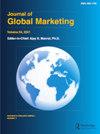消费者在培养对品牌的态度时,真的关心企业社会责任吗?
IF 4.3
Q1 Business, Management and Accounting
引用次数: 12
摘要
摘要本研究评估了感知企业社会责任(PCSR)维度与消费者对品牌认知之间的关系。本文针对PCSR采取的方法是基于以维持为中心的范式。在此模型下,PCSR包括三个维度:经济、社会和环境。因此,提出了一个由11个假设组成的系统,并对其进行了实证检验。使用521名受访者的结构化问卷对假设中的结构测量进行评估。参与者评估了墨西哥两家大公司的品牌。路径结构方程模型用于检验假设。结果表明,在PCSR的三个维度中,只有经济和社会维度会影响与品牌认知相关的变量。所提出的模型表明,通过企业信誉、品牌识别和感知功能价值,对品牌态度具有解释力。研究结果表明,尽管越来越多的社会努力鼓励环保意识,但消费者在评价品牌时忽视了企业的环保责任。本文章由计算机程序翻译,如有差异,请以英文原文为准。
Do Consumers Really Care about Aspects of Corporate Social Responsibility When Developing Attitudes toward a Brand?
Abstract The present study assesses the relationship between the dimensions of perceived corporate social responsibility (PCSR) and consumer perceptions about a brand. The approach taken herein for PCSR is based on the sustain-centric paradigm. Under this model, PCSR comprises three dimensions: economic, social, and environmental. Accordingly, a system of 11 hypotheses embedded in a conceptual framework is proposed and empirically tested. Measurements for the constructs in the hypotheses are assessed using a structured questionnaire with 521 respondents. The participants evaluated the brands of two major companies in Mexico. Path structural equation modeling is used to test the hypotheses. The results show that, of the three dimensions of PCSR, only economic and social dimensions affect variables related to brand perceptions. The proposed model suggests an explanatory power over attitude toward a brand through firm credibility, brand identification, and perceived functional value. The results imply that consumers disregard firm environmental responsibility when evaluating brands despite growing social efforts attempting to encourage environmental consciousness.
求助全文
通过发布文献求助,成功后即可免费获取论文全文。
去求助
来源期刊

Journal of Global Marketing
Business, Management and Accounting-Business and International Management
CiteScore
6.80
自引率
0.00%
发文量
10
期刊介绍:
Stay current on cross-cultural marketing at both micro and macro levels! The Journal of Global Marketing is the top-notch journal packed with the latest global marketing planning and programming strategies, current information, and contemporary research findings on marketing challenges and opportunities that firms, industries, and public sector agencies encounter worldwide. The expert contributors to the journal include leading marketing and international business scholars, practitioners, and policymakers who provide up-to-date practical information vital for management and administrative professionals.
 求助内容:
求助内容: 应助结果提醒方式:
应助结果提醒方式:


